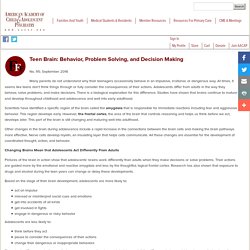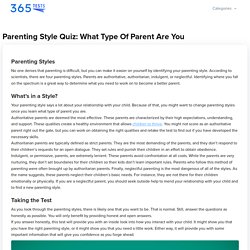

By transforming psychological theories into bite-sized information, this resource centre aims to provide parents with practical solutions to influence their children. A teenager's developmental process. Teen Brain: Behavior, Problem Solving, and Decision Making. Teen Brain: Behavior, Problem Solving, and Decision Making No. 95; September 2016 Many parents do not understand why their teenagers occasionally behave in an impulsive, irrational, or dangerous way.

At times, it seems like teens don't think things through or fully consider the consequences of their actions. Adolescents differ from adults in the way they behave, solve problems, and make decisions. There is a biological explanation for this difference. Stages of Adolescence. By: Brittany Allen, MD, FAAP & Helen Waterman, DO Adolescence is the period of transition between childhood and adulthood.

It includes some big changes—to the body, and to the way a young person relates to the world. Video: How does the Teenage Brain work? Video: Why Are Teens So Moody? What is Operant Conditioning? How can parents influence their children with Operant Conditioning. What is reinforcement? Role of the Reinforcer. Reinforcement: positive and negative. Video: The Big Bang Theory- Positive Reinforcement. Ways to administer reinforcements. What is punishment? Role of the Punisher. Punishment: Positive and negative. Effectiveness of punishment. Reinforcement strategies. Video: Positive Reinforcement - Tips for teaching and parenting.
Discipline strategies for teenagers. Teenage discipline: the basics Discipline isn’t about punishment.

It’s about teaching children appropriate ways to behave. For teenagers, discipline is about agreeing on and setting appropriate limits and helping them behave within those limits. When your child was younger, you probably used a range of discipline strategies to teach him the basics of good behaviour. Now your child is growing into a teenager, you can use limits and boundaries to help him learn independence, take responsibility for his behaviour and its outcomes, and solve problems.
Video: Big Bang Theory - Negative Reinforcement vs Positive Punishment. Establish your role as a parent. How to be a positive parent. Parenting Style Quiz. Parenting Style Quiz: What Type Of Parent Are You. Parenting Styles No one denies that parenting is difficult, but you can make it easier on yourself by identifying your parenting style.

According to scientists, there are four parenting styles. Parents are authoritative, authoritarian, indulgent, or neglectful. What Kind of Parent Are You? - Quiz - Quizony.com. The value of reinforcing positive behaviour for our teens. As children approach adolescence, they sometimes begin testing limits, bending the rules and otherwise going against the grain.

While this is normal behaviour for teens, it can be incredibly trying for you, as a parent. Teenagers may also be dealing with the stresses that come with trying to fit in with their peers and assert their growing independence. However, at the same time, they are looking for validation from the adults around them. It's crucial, therefore, for parents and teachers to provide as much guidance and positive reinforcement as possible, rather than simply tightening the rules. Top 10 Parenting Tips. Parenting advice changes so often that it's easy to feel like you're doing it wrong no matter what.

But Laura Markham, PhD, author of Peaceful Parent, Happy Kids, has her own tips that have nothing to do with choosing between grounding and the time-out chair. Instead, they're all about your relationship with your child. 1. Connect. Set aside "10 minutes of special time with you every day for each child. References.